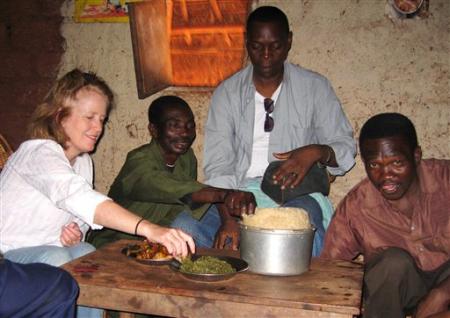
"I first arrived on their mud-hut doorsteps in 1979, a freckle-faced Peace Corps volunteer come to teach their children English. It was here in Kamponde that I first felt the heady rushes of teaching a class and of dancing around a fire. It was here that I prayed for rain so I could wash my long hair. I discovered the simple pleasure of sitting alone, and walked behind mothers carrying babies to their graves. In 1981, when my two-year tour was over, the Peace Corps shut down the post in Kamponde because of spreading corruption and chaos. The Peace Corps never came back, but in 1996 I did, renewing ties with the people who'd looked after me when I was just a girl. "
RPCV Beth Duff-Brown Returns to Congo Village That Suffers From Ravages of War, Disease
One Woman's Return to Ravaged Congo
Former Peace Corps Worker Returns to Congo Village That Suffers From Ravages of War, Disease
By BETH DUFF-BROWN
Caption: Beth Duff-Brown and her former Peace Corps cook, Tshinyama Mwananzoi, left, share lunch with other family members and friends in Kamponde, Congo in this Sept.
KAMPONDE, Congo Nov 25, 2006 (AP)— Stiff and weary from 100 miles down a rutted dirt road, I was grateful when signs of the village finally appeared: the sour smell of manioc root, smoke from brush fires set to scatter the snakes, thatched roofs backlit by the setting salmon sun.
I waved at barefoot children; some of their faces froze in fear at seeing their first white woman. Women in soiled sarongs, buckets of water or bundles of sweet-potato leaves on their heads, bolted into the bush when the grinding gears of the 4x4 frightened them.
I saw no familiar faces. I was not surprised. The average life span here is 50 years, and I had been gone a long time. Would anyone know that I had kept my promise to return?
Since my last visit, civil war had devastated the Congo. It wasn't a war over ideology or religion or tribal hatreds. It was a war over which warlord would get to exploit the country's vast mineral wealth. It was about power and greed.
Kamponde had escaped the fighting, but there was no escaping the disease and privation that it caused. Nearly 4 million had died, making it the deadliest conflict since World War II.
Even today, 1,200 Congolese die daily from the indirect effects of the war. How many, I wondered, have been from this village of 5,000 from my village?
I first arrived on their mud-hut doorsteps in 1979, a freckle-faced Peace Corps volunteer come to teach their children English. It was here in Kamponde that I first felt the heady rushes of teaching a class and of dancing around a fire. It was here that I prayed for rain so I could wash my long hair. I discovered the simple pleasure of sitting alone, and walked behind mothers carrying babies to their graves.
In 1981, when my two-year tour was over, the Peace Corps shut down the post in Kamponde because of spreading corruption and chaos.
The Peace Corps never came back, but in 1996 I did, renewing ties with the people who'd looked after me when I was just a girl.
They were amazed to see me then, but sad to learn I had no children of my own. Children are a symbol of hope and the measure of prosperity here. As we said our goodbyes, the people of Kamponde promised to call on their gods to bless me with child.
Now I was back again, fearing the worst but hoping to find a few familiar faces. Hoping there was someone who once knew me left to look at pictures of Caitlin, my blue-eyed little girl. Someone I could thank for the prayers.
The face I most longed for was that of Tshinyama Mwananzoi, the sweet man who cooked for the Peace Corps volunteers. I could still picture him wiping his hands on an apron fashioned from an old flour sack, his amber eyes red-rimmed from the hot coals that boiled his pili-pili pepper sauce and baked his sweet banana bread. But he would have been well past the average life span by now.
Moments after I arrived, the village priest gazed into the darkening sky and said the cook who had worked for the foreigners had passed.
Then where was his grave, I demanded to know, with a bitterness that caught both of us by surprise.
"Miss Elizabeth?" villagers murmured wonderingly. They were gathering about me by the wooden doors of the red brick church as the moon rose above the mango trees. There is no electricity here and few can afford kerosene for their lamps, so the stars shone brighter than any I had seen in many years.
Joseph, barefoot and trembling in his threadbare white shirt, was the first familiar face to emerge from the shadows. And there was Joseph's neighbor, Placide, and their elderly wives, too.
"I thank God for inspiring you to come back, remembering the place where you once taught our children," Joseph said.
Years ago, Joseph's and Placide's children had peppered me with questions, letting me practice my Tshiluba, the Bantu dialect spoken here: How does the sun stay up in the sky? Is it true Americans have magic boxes that carry them from one floor to the next? Was your president really just a peanut farmer like ours?
Those children were grown men and women now those who had survived. One in five children here die before age 5.
Ten years ago, people had too much dignity to ask me flat out for money, for food, for the shoes on my feet. Now, such demands exhausted me by the end of each day.
Nearby, the classrooms where I once taught were a deathly quiet. Later, I sat at one of the wooden desks, where someone had carved sweetheart initials slashed by an arrow. A gentle breeze came off the savanna through windows that had not seen glass in years.
The school's electrical power and running water are now just a memory. The cafeteria had burned down and the dormitories had been boarded up. But when I closed my eyes, I could still hear the wolfish laughter of my first class of rowdy 12th graders.
They had frightened and infuriated me by making smooching sounds when I turned to the board, but won me back by respectfully averting their eyes when a gust blew open my wraparound skirt.
Now, most of the students were out in the fields, their backs bent as they planted peanuts, corn, manioc and beans before the rainy season set in. The teachers, who had not been paid in two months, were on strike.
Yes, it was unfair, the headmaster shrugged, but sacks of government currency needed to pay them had not arrived. It couldn't come by train because the railroad was on strike. It wasn't coming by road because few commercial vehicles are moving now. Not with the country's infrastructure in shambles after the long war. Not with the price of gasoline fluctuating as high as $15 a gallon. When the payroll comes, it probably will be by bicycle.
Marceline Kanyi Mushimbi, 43, and Kamulombo Mutongo, 46, lamented their status as unpaid teachers. Once, they had been among my favorite students. She was shy but determined to graduate as one of a handful of girls alongside hundreds of boys. He would jump off his bench with a radiant grin to pick the pronoun or fill in the verb. A married couple now, they work the fields to feed their eight children.
"We are intellectuals, but our hands are all torn up from machetes, hoes and working under the sun," Kanyi said. "The villagers mock us: `Look at you, the smart ones who went to school.'"
Ten years ago, Marie Kabuanga Mutanga was a beautiful young woman who charmed me into giving her some clothes and lipstick.
Now 28, she lay on a rattan mat on the dirt floor of her hut, a tin cup with plastic rosary beads and a twig of bougainvillea beside her balding head. She was too weak to speak, but her hands plucked at the mat. Her bones poked painfully into the hard ground.
A parasite, insisted her mother, one of the village prostitutes; but Sister Kapinga Clementine, the Catholic nun who works in the village maternity clinic, said Marie was dying from the "four-letter word."
It's a word no one here likes to say out loud. And yet, AIDS is not Kamponde's greatest killer. More die of malaria, of parasites, of tuberculosis, of colds that turn into pneumonia for lack of medicine.
With little moving by road or rail, there's no way to hitch a ride to the nearest hospital, 100 miles away. "Sometimes we try to take them by bicycle," Sister Clementine said, "and some of them just die on the way."
Some medicines find their way here, but few can afford them. At the village's small pharmacy, I saw a man pay 58 cents for a five-day supply of quinine for his malaria-infected 8-year-old daughter. That's double the daily income for the average Congolese.
Marie's eyes, made larger by her hollowed cheeks, pleaded silently. There was little I could do for her. It brought back the helplessness I have often experienced here the feeling of being useless, of raising hopes that will not be met.
At the village's one small shop, I order a foam pad to make her last days a bit more comfortable. The shopkeeper dispatched a kid on a two-day bicycle journey to fetch it from another village 45 miles away.
Later, before I left Kamponde, another pretty young woman who cooks and cleans at the Catholic mission sweetly asked me for some lipstick.
The Hutu woman was stick-thin, with wild hair. She and her husband had fled into the bush when I first arrived in the village.
They were refugees from the genocide in neighboring Rwanda, where Hutus and Tutsis had slaughtered one another in vast numbers in the mid 1990s. Thousands of Hutus had fled to the Congo, pursued by Tutsis and a Congolese warlord allied with them. Many were killed along the way. This couple, somehow, had made it to Kamponde.
She ran from me, Anatazi Mukaluzita now told me, because she feared I had come to drag her back to Rwanda. Her husband was still hiding, she said, but "I told him, 'We are already dead, so I might as well just talk to her.'"
She wept with relief when, through a Swahili-speaking interpreter, I told her I only wanted to hear her story. She wasn't sure how she and her husband made it this far, she said. She didn't know the fate of her six children. But she was grateful that the village had taken them in, allowing them to work the fields in exchange for food.
Later, some villagers told me the Hutu couple was forced to work like slaves.
Late one night, a man bicycled by moonlight for miles to catch me before bed.
I could not see him in the dark, but heard others greet him as he approached. I tried not to cry as I listened to the elders asking him about his hunts, his grandchildren, the village where he now lives.
He came toward me from the shadows; we embraced awkwardly, a middle-aged American woman and an old African hunter with a dark beard two people who never thought they would see each other again.
"Ahh-ahh-ahh, Miss Elizabeth, I can't believe it, you kept your promise," Tshinyama said in his singsongy voice.
The village priest had confused him with another cook who had died several years ago. That made Tshinyama furious. It was bad luck, he said, to talk of his death.
After I left Kamponde in 1981, I had arranged for Tshinyama to move to Kananga and cook at the regional Peace Corps house there. The job lasted until 1991, when the Peace Corps abandoned the country altogether because of the rioting and violence.
Tshinyama walked home and intended to go back to his fields. But, he explained, other family members had taken over his crops. So he packed up his brood and, at age 45, moved to Mfuamba Kabang, some four miles southeast of Kamponde, to start a new life. By now, his Marie had given birth to 12 children, but had lost at least five.
Later, someone would tell me Tshinyama left Kamponde because he feared a spell had been cast against his family, causing their babies to die.
We asked each other many questions about friends and family, joked about who had put on the most weight, grown the most gray hair.
"Maybe you can never forget me," Tshinyama said, "because your belly was always full."
Men returned from the forest balancing jugs of palm wine on sticks across their shoulders. Cooks boiled manioc and corn flower to make hot mounds of sticky bread known as fou-fou. A fat black goat was led toward the big black cauldrons behind the church.
My party for the village cost $100 double what I spent on a similar affair 10 years ago. Everything costs more now, and people have less money. The per capita income in the Congo is lower today than it was when the country broke from Belgium colonialism 46 years ago.
As bamboo xylophones and goatskin drums warmed up the crowd, the men laughed and guzzled wine and corn whiskey. The women danced, and I got up to join them, provoking pursed smiles from the nuns and cheers from others.
The men are mostly uneducated farmers, but well-informed from hours of pressing their ears to transistor radios. They had just voted in the country's first multiparty elections in 40 years, but were unconvinced that either candidate could rise above warlord status and bring the stability they all craved.
As the night wore on, I stood before the crowd a few hundred by now and thanked them for all they had given me. I told them I would return again, if I could, and bring Caitlin with me.
The women sashayed to the words of a new song: An Elizabeth tree grew deep roots in their village. Its seed, little Caitlin, had fallen far from this ground but remains the fruit of Kamponde.
On my last day, I set off on foot through the savanna to the village of a few dozen square huts that Tshinyama now called home. I was apparently the first foreigner ever to visit there.
Tshinyama's home was decorated with antelope antlers. A few yellowing magazine ads of Western food on gleaming plates were tacked to his whitewashed mud walls.
We sat inside, eating with our hands, as he showed off his homemade rifle. I gave Marie some Indian cloth. I didn't know if she could see the bright paisley patterns through her glaucoma-clouded eyes. I left Tshinyama enough cash for a new bicycle and a cellular phone. There's now a weak signal in Kamponde, and some clever types were making money selling phone calls.
We both knew that even if I make it back to Kamponde someday, it is unlikely we will ever meet again.
"Washala bimpe, tatu," I choked, as we grasped hands to say goodbye. "Stay well, father."
"Wayi bimpe, mamu" "Go well, mother."
Copyright 2006 The Associated Press. All rights reserved. This material may not be published, broadcast, rewritten, or redistributed.

















